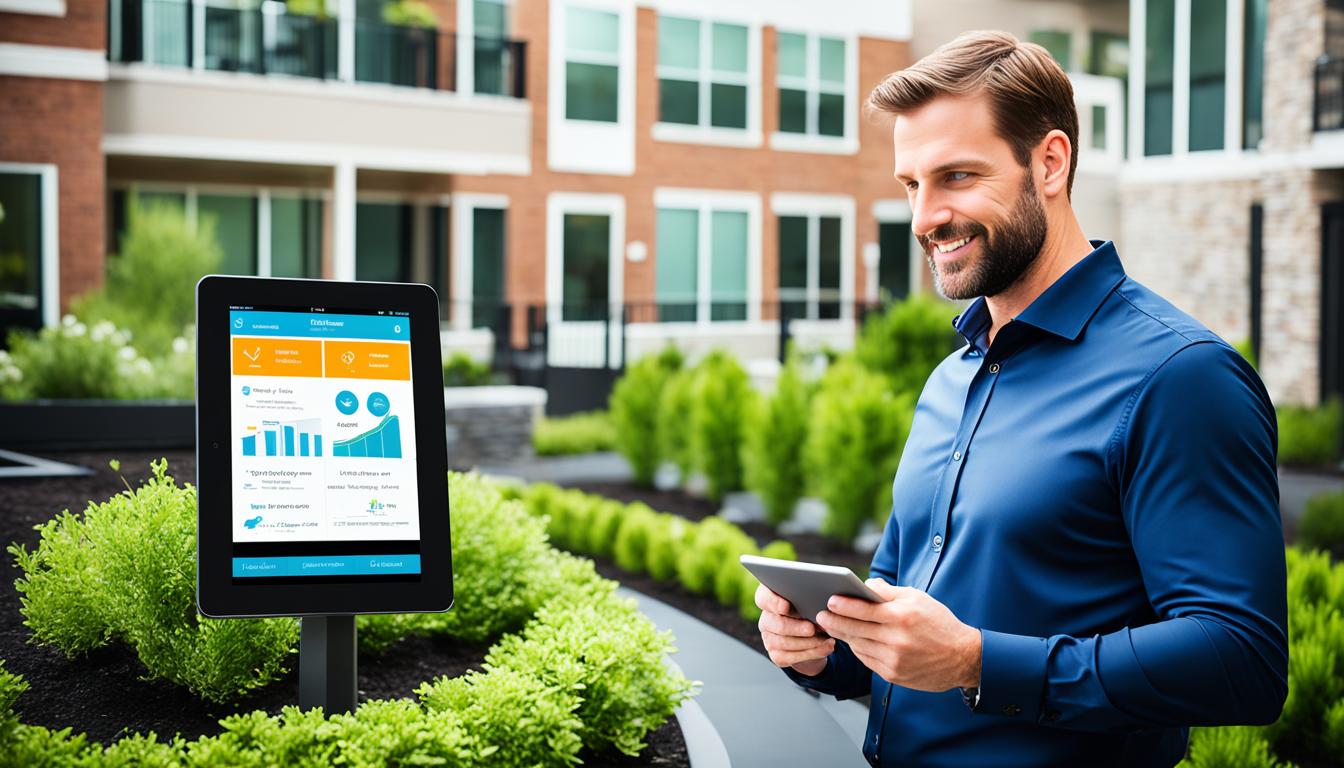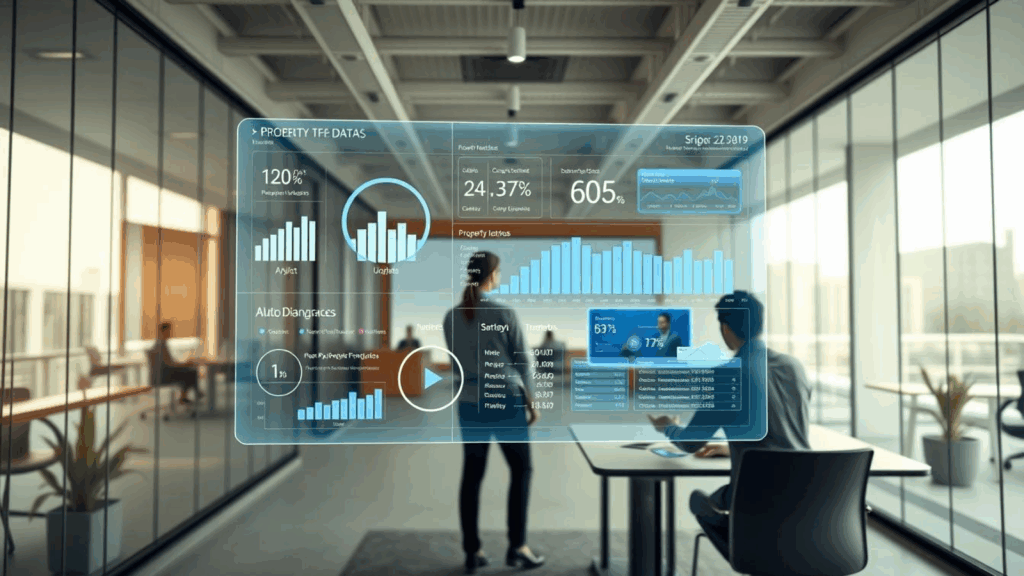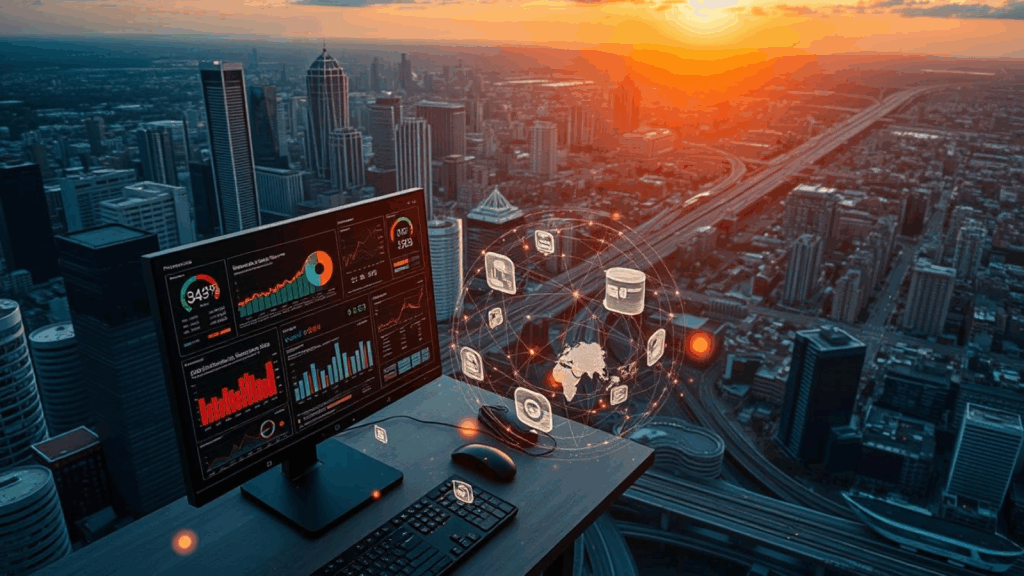As you delve into the world of property management, it’s clear that cutting-edge technology is setting new standards in the industry. With property management technology leading the charge, tasks once marred by complexity are now streamlined. Imagine handling your leasing agreements, tenant communications, and maintenance requests with ease, all thanks to the advancements in digital property management systems.
Whether you’re overseeing residential complexes or sprawling commercial properties, the sophisticated features of residential property management software offer a convenient, centralized hub for all your managerial needs. These innovative solutions are not just about keeping up with the times; they’re about elevating the entire scope of real estate management solutions to new heights, bringing you efficiency and precision like never before.
Key Takeaways
- Embrace innovation: Discover how robust technology can transform your property management approaches.
- Seamless operations: Learn about software that centralizes and simplifies your day-to-day tasks.
- Real-time management: Gain insight into digital systems that offer real-time analytics and remote control.
- Enhanced communication: Understand the value of always-on tenant portals for improved interactions and satisfaction.
- Cost-effective strategies: Find out how technology can help cut costs and increase operational efficiency.
- Future-ready: Prepare yourself for the next wave of tech advancements in property management.
Exploring the Evolution of Real Estate Maintenance
The real estate industry is witnessing a significant shift with the integration of technology that is making property maintenance more streamlined and user-friendly. This pivotal transformation is being led by innovative landlord software and rental property management tools, aimed at enhancing the operational performance of properties large and small.
The Rise of Property Management Technology
Revolutionary changes in the sector are powered by commercial property technology, which is reshaping the landscape of facilities management. Now, property managers can leverage platforms that automate tasks and provide insightful data, facilitating smarter decision-making and freeing up valuable time that was once consumed by routine administrative work.
Transitioning from Traditional Practices to Digital Efficiency
The move from traditional to digital practices has been crucial in redefining property management. Enhanced digital efficiency is burgeoning through the use of comprehensive facilities management platforms that provide a seamless experience for both managers and tenants. This efficiency is not just about doing things faster, but doing them smarter and with greater accuracy.
Impacts on Tenant Experience and Operational Performance
These advancements are profoundly impacting tenant experience, with many now enjoying the benefits of real-time communications and streamlined services. For property managers, the operational gains are equally significant, with technology revealing deep insights into property performance and tenant behaviors, enabling proactive management and maintenance.
| Conventional Methods | Digital Property Management |
|---|---|
| Manual data entry and analysis | Automated reporting and analytics |
| Physical inspections | Real-time monitoring with smart devices |
| Reactive maintenance scheduling | Predictive maintenance for optimal scheduling |
| Standard tenant communication channels | Instant tenant feedback and communication platforms |
The fusion of traditional and modern practices has given birth to a new realm of management tools, enabling landlords and property managers to achieve previously unattainable levels of tenant satisfaction and building efficiency. As we continue to embrace this digital transition, your role in real estate maintenance is being revolutionized by the day, thanks to these sophisticated rental property management tools and the robust facilities management platforms at your disposal.
How Property Management Software Enhances Efficiency
As you delve into the modern landscape of real estate management, it’s clear that cloud-based systems and digital property management systems are revolutionizing the industry. No longer do routine tasks require manual labor; instead, property management software has emerged as the keystone to operational efficiency. Imagine having all your leasing, reporting, and communication centralized in a single, accessible, digital hub. This is not the future; it’s the present, allowing you to make decisions swiftly with all the necessary information just a click away.
The capacity of these real estate management solutions for fostering teamwork should not be overlooked. Through various tools for clear communication and document sharing, they break down silos and encourage stakeholders to collaborate, directly feeding into tenant satisfaction and the seamless operation of tasks.
- Centralized Data Access: Enhancing decision-making with immediate information retrieval.
- Automated Reporting: Streamlining task management with scheduled user-friendly analytical reports.
- Enhanced Collaboration: Providing a shared platform that makes communication smooth and direct.
- Transparent Tenant Communications: Offering features for immediate, clear, and tracked tenant-manager exchanges.
- Maintenance Coordination: Simplifying the process of managing maintenance requests with systematic workflows.
Let’s take a deeper look at how adopting a robust property management platform can transform the day-to-day responsibilities of property managers.
| Manual Task | Digital Solution | Benefits |
|---|---|---|
| Lease Tracking | E-documentation | Saves time & reduces paper clutter |
| Rent Collection | Online Payments | Improves cash flow & tracking |
| Maintenance Management | Integrated Ticketing System | Facilitates quicker, more organized responses |
| Financial Reporting | Automated Analytics | Generates insights for better budgeting |
| Communication with Tenants | Interactive Portals | Increases transparency & engagement |
Each component of this digital transformation serves to elevate not just the efficiency but the quality of property management. A structured and user-friendly digital ecosystem is no longer a luxury—it’s an essential facet of contemporary real estate management. Your transition to this digital realm will undoubtedly bring about a more fluid operational model where time and resources can be invested in growth rather than mere maintenance.
Integrating Smart Home Technology into Property Management
The transition to smart home technology is more than a convenience; it’s a revolution in how property management operates. Imagine you could manage energy systems, provide keyless entry, and even monitor security remotely. These capabilities are transforming the way you handle everyday property management technology tasks, setting a new standard for efficiency and response times.
With digital property management systems, you can now tap into predictive maintenance features. These systems don’t just inform you when something breaks; they predict potential issues before they happen, saving time and money while increasing safety and satisfaction for tenants.
- Remote monitoring and management of property utilities
- Automated alerts for proactive property upkeep
- Enhanced tenant satisfaction through innovative tech amenities
- Energy savings with intelligent climate control
| Features | Benefits |
|---|---|
| Intelligent Thermostats | Reduces energy costs and offers personalized climate control |
| Smart Locks | Provides secure, keyless entry and tracks access |
| Water Leak Sensors | Prevents costly damage by detecting leaks early |
| Connected Security Cameras | Enhances property surveillance and tenant peace of mind |
Embracing smart home technology in the realm of property management is more than just keeping up with trends. It’s about providing a superior level of service that anticipates needs and offers solutions at the touch of a button. For you, it’s an opportunity to redefine what it means to be a state-of-the-art property manager in today’s digital world.
The Role of Data Analytics and AI in Property Management Decisions
In the landscape of property management, the intelligent application of technologies like data analytics, AI, and machine learning is becoming increasingly critical. The insights gleaned from this innovative confluence are not just reactive data points but proactive tools for shaping the future of how properties are managed. Integrating these technologies is key in advancing the resilience and responsiveness of digital property management systems, transforming them into dynamic resources capable of predictive maintenance and personalized tenant services.
Utilizing Predictive Maintenance for Cost Saving
The ethos of predictive maintenance in property management rests on the ideation that prevention is better than cure. By leveraging the predictive capabilities of AI and machine learning, property managers can significantly reduce downtime and associated costs. With data analytics infusing precision into maintenance schedules, resources are allocated efficiently, circumventing the traditional approach of reactive maintenance which can often be both costly and inconvenient.
- Reduced Maintenance Costs: Avoid unexpected breakdowns and high repair expenses.
- Extended Asset Life: Regular, data-informed maintenance prolongs the longevity of property assets.
- Optimized Resource Allocation: Deploy staff and resources where they are needed most, based on predictive trends.
Personalizing Tenant Services through Data Insights
By coupling the deep learning aspects of AI with data analytics, property managers are now able to offer personalized tenant services. Predictive analytics, drawn from tenant behaviors and preferences, enables a customized experience for tenants, enhancing satisfaction and retention. This level of service, powered by digital property management systems, is proving to be a differentiation factor in a competitive market.
| Tenant Need | Data-Powered Solution | Outcome |
|---|---|---|
| Efficient energy usage | AI-driven energy management systems | Reduced utility costs and improved tenant comfort |
| Quick maintenance requests | Mobile apps with predictive issue tracking | Lower wait times and higher tenant satisfaction |
| Customized living experiences | Personalized recommendations through data analysis | Higher tenant engagement and loyalty |
The Revolution of Real Estate Management Systems
In the fast-evolving landscape of property management, real estate management systems have become the cornerstone of innovation. These comprehensive platforms are streamlining operations, ensuring efficiency in every corner of the real estate market. If you’re involved in managing properties, embracing these systems can revamp your approach to handling various tasks and can significantly impact your productivity.
Whether you’re dealing with residential properties, commercial spaces, or sprawling estates, leveraging a residential property management software streamlines the array of processes entangled with managing these investments. Similarly, a facilities management platform is indispensable for the maintenance and operation of larger complexes and corporate facilities, ensuring all moving parts are in tune.
- Task Simplification: From collecting rent to processing maintenance requests, these systems are reshaping the realty management arena.
- Integration: The seamless connectivity with other platforms makes financial and stakeholder communication a breeze, boosting overall efficiency.
- Data Analytics: The data harvested by these systems is a goldmine for analytics, shedding light on financial health and helping you make informed decisions.
Now, let’s hone in on some of the transformative advantages of adopting these next-gen systems:
| Feature | Benefits | Impact on Management |
|---|---|---|
| Cloud-Based | Accessibility from anywhere, any device | Agility in operations and response times |
| Automated Reporting | Accurate, real-time financial data | Strategic planning and performance tracking |
| Integrated Communications | Dedicated tenant and stakeholder portals | Enhanced satisfaction through prompt service |
| Payment Systems | Efficient rent and fee collections | Fiscal stability with streamlined cash flows |
| Maintenance Coordination | Schedule and track service orders efficiently | Proactive property upkeep and happy tenants |
As you can see, adopting a robust real estate management system doesn’t just make your life easier but also has ripple effects that benefit tenants, investors, and your bottom line. Now is the time to transform your property management process and stay ahead of the curve.
So, take a moment to reflect on your current management tools. Are they living up to the potential of what’s available today? If not, it might be time to consider an upgrade to a system that will carry your property management efforts into the future.
Adapting to Remote Management Capabilities with Cloud-Based Platforms
As the real estate industry continues to evolve in this digital age, cloud-based platforms have become essential for property managers looking to stay competitive and efficient. By leveraging the flexibility of digital property management systems, you can oversee properties and engage with teams and tenants across the globe without being physically present. This shift towards property management software geared for remote accessibility is a game-changer, ensuring you’re never out of touch from the operations that matter.
Facilitating Seamless Communication via Online Portals
Online portals are a cornerstone of effective cloud-based platforms, offering a real-time conduit for seamless communication. Thanks to these digital property management systems, you’re now equipped to send out community updates, manage service requests, and share essential documents with ease. Such capabilities not only spell out increased efficiency but also contribute greatly to building and maintaining trust through transparency and swift action.
Promoting Real-Time Collaboration Among Property Teams
Cloud-based platforms are changing the dynamics of property management teamwork. They allow you to collaborate in real-time, ensuring that no matter where your team members are, they can work together as if they’re in the same room. This instant collaboration is instrumental in addressing tenant concerns quickly, scheduling maintenance efficiently, and resolving issues without the delay traditionally tethered to geographic constraints.
| Feature | Benefits |
|---|---|
| Cloud Storage | Centralized access to all property documents and records |
| Automatic Updates | Always up-to-date software without manual intervention |
| Mobile Accessibility | Manage your property portfolio from anywhere at any time |
| Data Security | Advanced encryption and security measures to protect sensitive information |
| Integrated Communication Tools | Streamlined communication channels for tenants and management teams |
Impact of Virtual Tours and 3D Visualization on the Leasing Process
As you navigate the world of property leasing, you have likely noticed the transformative role virtual tours and 3D visualization play in modern real estate. These technologies have revolutionized the experience for prospective tenants and property managers alike, offering a digital dynamic that aligns perfectly with contemporary digital property management systems.
The convenience and detailed perspective brought about by virtual tours allow potential tenants to vividly imagine themselves within the space, without stepping foot on the property. This shift towards digital viewing helps in expediting the decision-making process, catering to modern-day expectations for swift and accessible information.
3D visualization further enriches this experience by providing a high-fidelity representation of properties, delivering crucial spatial understanding that flat images simply cannot match. For you, as a property manager, incorporating these digital solutions into your leasing strategy can result in a more efficient and competitive leasing process.
Adapting to these advancements also means that you can significantly cut down the number of in-person showings, saving on both time and expenses. To illustrate the benefits of these digital tools, consider the comparison below:
| Traditional Leasing Attributes | Leasing with Virtual Tours and 3D Visualization |
|---|---|
| – In-person property viewings | – Immersive virtual exploration |
| – Limited viewing times | – Accessible 24/7 online tours |
| – Static images and floor plans | – Interactive 3D property models |
| – High costs for multiple showings | – One-time creation cost for virtual content |
| – Geographical restrictions | – Global reach without location constraints |
| – Schedule coordination for visits | – Instant access without scheduling |
The bottom line is that digital property management systems, when augmented with virtual tours and 3D visualization, not only propel leasing processes but also enhance the satisfaction and convenience of the experience for everyone involved. By embracing these tools, you’ll be setting a new standard in rental property marketing and management, catering to a tech-savvy tenant base that values digital efficiency and clarity.
Sustainable Property Management Through Energy Efficiency Innovations
In your effort to adopt more sustainable practices in property management, energy efficiency stands at the forefront as an actionable and impactful strategy. By embracing renewable energy technologies, you’re not only championing environmental stewardship but also setting the stage for substantial cost savings in the long run.
Incorporating Renewable Energy Technologies
Transitioning to renewable energy technologies is a bold step towards sustainability in property management. It’s an investment in the future, ensuring that your properties are equipped with cutting-edge solutions to harness natural resources effectively. Solar panels, wind turbines, and geothermal systems are no longer futuristic concepts but present-day realities for properties looking to reduce their carbon footprint while also shrinking energy-related expenses.
Reducing Environmental Impact and Operational Costs
Property managers are now uniquely positioned to make a positive environmental impact while also benefiting financially. Incorporating energy efficiency measures not only lowers utility bills but also aligns with the growing demand from tenants for eco-conscious living environments. This convergence of ecological and economic benefits makes a compelling case for integrating sustainability into the core of property management.
The table below highlights the benefits and considerations of various renewable energy technologies that can be integrated into property management:
| Technology | Environmental Benefits | Cost Savings | Considerations |
|---|---|---|---|
| Solar Power | Reduces greenhouse gas emissions | Decreases electricity costs | Requires suitable roof space and sunlight exposure |
| Wind Energy | Generates clean, renewable energy | Can provide a long-term fixed power price | Ideal for properties in windy locations |
| Geothermal Systems | Minimal environmental disruption | Reduces reliance on conventional heating/cooling | Higher initial installation cost |
| Hydroelectric Power | Produces no direct waste or pollution | Provides a stable energy source | Location-dependent and requires water source |
Remember, the transition to energy-efficient practices and renewable energy technologies in property management is not just a matter of environmental preservation. It’s also a strategic move towards operational excellence and future-proofing your investments. By focusing on sustainability, you’re helping to shape a world where property management plays a pivotal role in the stewardship of our planet.
Conclusion
The landscape of real estate management has been irreversibly reshaped by the advent of cutting-edge property management technology. By integrating both digital property management systems and advanced property management software, you’ve gained access to an unparalleled suite of tools designed to refine and enhance every aspect of property oversight. It’s a transformative period marked not only by ease of operation but also by a significant leap towards future-focused methodologies.
Now, you stand at the forefront of an era where real estate management solutions are not just about managing, they’re about thriving. With the potent combination of data analytics and AI, informed and strategic decisions result in cost savings and proactive problem-solving approaches. Likewise, by championing sustainable practices, you’re not only curbing environmental impact but also aligning with the values of a conservation-conscious clientele.
Embracing these innovations means you are set to experience a symphony of operational harmony, where centralized controls, data-driven strategies, and bolstered tenant satisfaction are the new norms. Such advances are sure to fortify your position in a competitive market, heralding a new era of innovation that continues to redefine the very essence of property management. The tools are at your fingertips, ready to propel your properties into an era of unmatched efficiency and sustainable success.
FAQ
What are the core benefits of property management technology?
Property management technology offers a range of benefits including increased efficiency, streamlined communication, enhanced tenant experiences, and the ability to make data-driven decisions. It simplifies tasks like tenant and lease tracking, maintenance coordination, and financial transactions, which can be managed with greater ease and accuracy.
How has property management technology transformed real estate maintenance?
The transition to digital efficiency has made real estate maintenance more proactive and predictive. With features such as smart home technology and integrated databases, property managers can optimize schedules, respond quickly to maintenance needs, and enjoy the added benefit of remotely managing properties.
What are the key features to look for in property management software?
Essential features to look for in property management software include integrated accounting, tenant and owner portals, mobile accessibility, automated reporting, and analytics. These features help in improving the efficiency of managing rental properties, both residential and commercial, and offer transparent communication and financial management.
How does smart home technology integrate with property management?
Smart home technology integrates with property management by allowing remote control and monitoring of property functions like energy use, security, and building systems. This can lead to more responsive maintenance and enhanced property management, offering tenants greater convenience and safety.
What role do data analytics and AI play in property management?
Data analytics and AI provide valuable insights into tenant behavior and operational efficiency, enabling targeted and strategic decision-making. They support predictive maintenance, tailored services for tenants, and cost-effective management by identifying patterns and preempting issues before they escalate.
How do property management systems simplify daily operations?
Real estate management systems centralize various tasks such as rent collection, service requests, and maintenance scheduling. Their integration capabilities allow seamless financial management and communication with stakeholders, while also providing robust data for performance analytics.
How have cloud-based platforms improved remote management of properties?
Cloud-based platforms have revolutionized remote management by providing online portals for uninterrupted communication, access to community updates, and document storage. These platforms allow real-time collaboration among property teams and enhance tenant relations by addressing issues and feedback promptly.
What is the impact of virtual tours and 3D visualization on leasing?
Virtual tours and 3D visualization have significantly impacted the leasing process by offering potential tenants immersive and interactive property viewing experiences from anywhere. This technology speeds up the decision-making process, reduces the need for physical visits, and meets the expectations of a tech-savvy consumer base.
How does incorporating renewable energy technologies contribute to sustainable property management?
Incorporating renewable energy technologies in property management helps reduce the environmental impact and operational costs, aligning with global sustainability initiatives. Such technologies can improve a property’s appeal to eco-conscious tenants and increase the long-term value of real estate investments.






